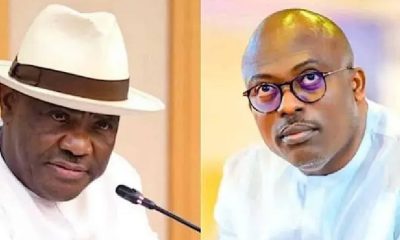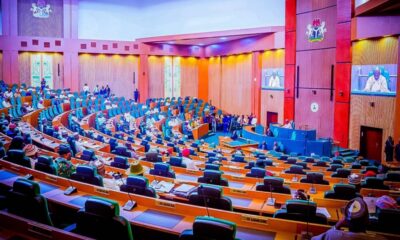Economy
Nigeria’s inflation rate to remain high in 2024 — World Bank

The World Bank, yesterday, said that Nigeria’s inflation rate will remain high at 24.8 percent year-on-year, YoY, in 2024.
The World Bank’s projection, however, is lower than February 2024 inflation, which stood at 31.7 percent.
The World Bank also reaffirmed its projection of 3.3 percent economic growth for the country in 2024 and reduced its projection for 2025 to 2026 by 0.1 percentage points to 3.6 percent from its January projection of 3.7 percent.
In its Africa’s Pulse Report, April 2024 edition, released yesterday, the Bretton Woods institution stated: “Growth in Nigeria is projected at 3.3 percent in 2024 and 3.6 percent in 2025–26 as macroeconomic and fiscal reforms gradually start to yield results.
“A more stable macroeconomic environment, as the reforms’ initial shock dissipates, will lead to sustained but still slow growth of the non-oil economy.
“The oil sector is expected to stabilize with recovery in production and slightly lower prices. “Structural reforms will be needed to foster higher growth.
“Average inflation will remain elevated at 24.8 percent in 2024, although it is expected to ease gradually to 15.1 percent by 2026 on the back of monetary policy tightening and exchange rate stabilization”.
According to the World Bank, food inflation and the weakening of domestic currencies are still major drivers of inflation across countries in the Sub Saharan Africa region.
It added: “By February 2024, about one third of the Sub-Saharan African countries with monthly available food price information (14 of 40 countries) had double-digit year-on-year rates of food inflation, with the fastest increases experienced in Ethiopia, Malawi, Nigeria, Sierra Leone, and Zimbabwe.”
It also noted that the rate of poverty reduction in the region is slow and that Nigeria and the Democratic Republic of Congo account for one in three of those living in extreme poverty.
“The region also faces the triple challenges of high extreme poverty, high inequality, and low transmission of growth to poverty reduction.
“The speed of poverty reduction has decreased tremendously since 2014. The rate of reduction was 3.1 percent between 2010 and 2014, subsequently decreasing to 1.2 percent between 2014 and 2019.
“In contrast, the rest of the world reduced extreme poverty on average by 9.2 percent per year within the same time horizon, suggesting that the Africa region is falling further behind.
“In addition, there is substantial regional heterogeneity in where the poor are with Nigeria and the Democratic Republic of Congo accounting for one in three of those living in extreme poverty.”
It added that the region can accelerate growth and poverty reduction substantially by tackling inequality, specifically structural inequality.
Economy
75.5% of rural Nigerians now live below poverty line — World Bank

The World Bank has disclosed that a staggering 75.5 per cent of rural Nigerians are now living below the poverty line, reflecting deepening hardship in the country’s hinterlands.
This was revealed in the Bank’s April 2025 Poverty and Equity Brief for Nigeria, which paints a grim picture of worsening economic hardship, widening inequality, and persistent underdevelopment across much of the nation.
While poverty is widespread among urban populations, the report emphasised that the situation is significantly worse in rural areas, where economic stagnation, high inflation, and insecurity have exacerbated living conditions.
“Based on the most recent official household survey data from Nigeria’s National Bureau of Statistics, 30.9 per cent of Nigerians lived below the international extreme poverty line of $2.15 per person per day in 2018/19 before the COVID-19 pandemic,” the report stated.
The report also highlighted Nigeria’s enduring regional disparities. “Nigeria remains spatially unequal. The poverty rate in northern geopolitical zones was 46.5 per cent in 2018/19, compared with 13.5 per cent for southern ones. Inequality measured by the Gini index was estimated at 35.1 in 2018/19.
“Nigeria’s Prosperity Gap — the average factor by which individuals’ incomes must be multiplied to attain a prosperity standard of $25 per day for all — is estimated at 10.2, higher than most peers.”
Despite successive policy interventions, these figures underscore a persistent economic divide across the country.
The report’s demographic analysis found that children aged 0 to 14 years had a poverty rate of 72.5 per cent, reflecting the scale of deprivation among the youngest segment of the population.
Gender disparities were also observed, with 63.9 per cent of females and 63.1 per cent of males classified as poor under the $3.65 per day lower-middle-income threshold.
Education emerged as a significant determinant of poverty, with Nigerians lacking formal education experiencing a poverty rate of 79.5 per cent. This contrasts with 61.9 per cent for those with primary education and 50.0 per cent for secondary school graduates. Only 25.4 per cent of those with tertiary education were considered poor.
The report also drew attention to multidimensional poverty indicators, which further reflect widespread deprivation.
According to the World Bank, about 30.9 per cent of Nigerians live on less than $2.15 daily, 32.6 per cent lack access to limited-standard drinking water, 45.1 per cent do not have limited-standard sanitation, and 39.4 per cent have no electricity.
Education access remains a challenge, with 17.6 per cent of adults yet to complete primary education, and 9.0 per cent of households reporting at least one school-aged child not enrolled in school.
The report noted that even before the COVID-19 pandemic, efforts to reduce extreme poverty had largely stalled.
“Before COVID-19, extreme poverty reduction had almost stagnated, dropping by only half a percentage point annually since 2010. Living standards of the urban poor are hardly improving, and jobs that would allow households to escape poverty are lacking,” the report read.
Although the World Bank acknowledged recent economic reforms aimed at stabilising Nigeria’s macroeconomic outlook, it warned that persistently high inflation continues to undermine household purchasing power, particularly in urban areas where incomes have not kept pace with rising costs.
In light of the worsening situation, the Bank called for urgent policy action to shield vulnerable groups from inflationary shocks and to drive job creation through more productive economic activities.
Economy
Naira Records Marginal Decline Against Dollar at Official Market

The Nigerian naira experienced a mild drop in value on Friday, closing at ₦1,602.18 per dollar in the official foreign exchange market, based on figures released by the Central Bank of Nigeria (CBN).
This marks a decrease of ₦5.49 from the rate of ₦1,596.69 recorded on April 30, the last trading day before the May 1 Workers’ Day holiday—indicating a depreciation of approximately 0.34%.
Earlier in the week, from Monday to Wednesday, the naira remained relatively stable, exchanging at ₦1,599.95, ₦1,599.71, and ₦1,596.69 respectively.
Although the local currency showed some consistency mid-week, it wrapped up the week with a loss, following a sligh dip of 0.02% at the beginning of the week
Economy
Black Market Dollar hits N1,610 Amid Economic quagmire

What is the Dollar to Naira Exchange Rate in the Black Market (Also Known as the Parallel Market or Aboki FX)?
Below is the black market exchange rate for the U.S. dollar to the Nigerian naira as of Thursday, May 1, 2025. These are the typical rates at which you can exchange dollars for naira:
Dollar to Naira Black Market Exchange Rate (May 1, 2025):
At the Lagos Parallel Market, also referred to as the black market, Bureau De Change (BDC) operators are buying dollars at ₦1,602 and selling at ₦1,610, according to market sources.
Please note: The Central Bank of Nigeria (CBN) does not recognize or endorse transactions conducted on the parallel market. The CBN advises individuals and businesses seeking foreign exchange to use official banking channels.
-

 Opinion15 hours ago
Opinion15 hours agoRIVERS, WIKE, FUBARA, AND THE WAY FORWARD
-

 Politics14 hours ago
Politics14 hours agoJust in: Delta PDP Reps members defect to APC
-

 News19 hours ago
News19 hours agoVDM may be released on Tuesday
-

 News13 hours ago
News13 hours agoTension As Lawmakers Warns of Public Revolt Over Insecurity
-

 News16 hours ago
News16 hours agoNANS Barricades Lagos-Ibadan Expressway Over Alleged NELFUND Mismanagement
-

 News16 hours ago
News16 hours agoCourt bans Nnamdi Kanu’s in-law from 3 proceedings over live streaming
-

 News11 hours ago
News11 hours agoEdo Speaker, Two Other Lawmakers, Formally Join APC
-

 News23 hours ago
News23 hours agoNASS Expected To Tackle Security Challenges Upon Resumption—-Nnamchi





